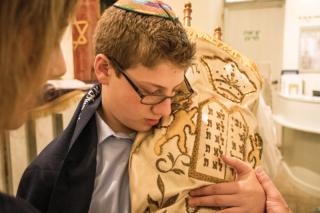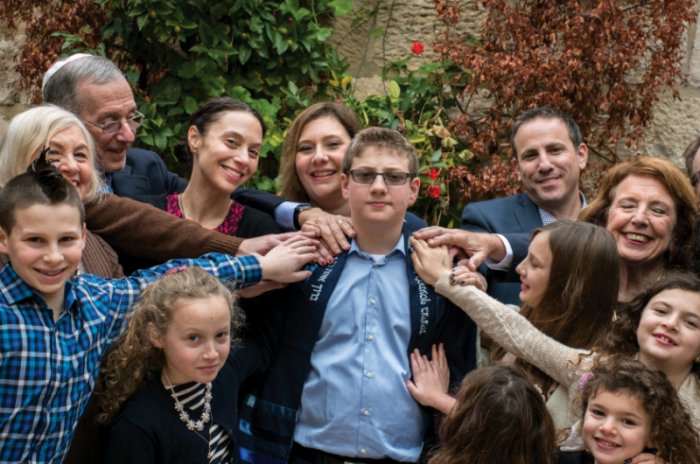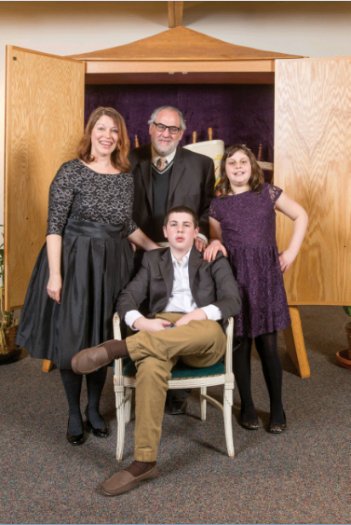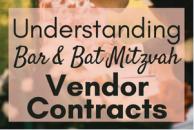
By Cara J. Moroze
For families with children who have special needs, preparing for a Bar or Bat Mitzvah ceremony may seem like an insurmountable challenge. But with planning, support and creativity, it is very achievable.
The preparations and the service itself may require adaptations and modifications, but one thing is for certain, the experience will be ritually and spiritually authentic. Key to a positive approach is individualized preparations and thoughtful attention to the child’s self-esteem, with collaboration from teachers, clergy and family. For as wide a range of learning differences that exist, there are as many approaches to support and celebrate a child entering Jewish adulthood.
GOALS AND TEAMWORK
First things first: A Bar or Bat Mitzvah service is not a performance, nor is it a competition. A child is no more a Bar or Bat Mitzvah because of the number of Torah verses that are chanted, the quantity of prayers that are memorized, the venue in which it takes place or the number of guests to witness it happen. This is all about celebrating a child’s emergence into Jewish adulthood, and celebrating that participation as ritually unique and significant.
A family must have an open and honest dialogue with synagogue staff about both the special gifts and limitations of their child. Discuss your vision for the ceremony. Express your concerns about what could trigger potential problems and how to foster a positive experience. Make it a team effort with achievable goals. Connecting your child’s teachers, paraprofessionals, speech pathologists or any other educational supporters with your B’nai Mitzvah tutor will help lay the groundwork for engaged and individualized learning.






In Westfield, NJ, Temple Emanu-El is host to a program called Ma’ayan, which offers a religious school program for any child of special needs, regardless of synagogue affiliation. “If there are behavioral, physical or developmental challenges, we find a way to make it work,” says Abra Lee, director of Emanu El’s religious school. “If a child has modifications outlined, we ask families to share that.” Ma’ayan then engages the synagogue’s inclusion coordinator to determine the next steps in Bar/Bat Mitzvah preparation with their highly skilled staff.
Some congregations with smaller education programs may only have rabbis and cantors at the helm, while others have directors, teachers and a tutoring staff. The Westchester Reform Temple (WRT) in Scarsdale, NY, is fortunate to have Nancy Abraham as their Learning Differences Coordinator. She works closely with families of children with learning challenges. Abraham not only identifies children’s individual learning styles, but she also develops strong relationships with the families at the start of their religious education. When it comes to working one-on-one with the children, “We connect with them emotionally,” she says. “We value every aspect of who they are and their identity. We appreciate what their talents and gifts are, and all that contributes to their B’nai Mitzvah progress.”
Amanda Kleinman, the assistant cantor who works closely with Abraham at WRT, approaches the process without any assumptions about what a child can or cannot do. “We encourage students to work hard and dedicate themselves, within a structure that is going to be realistic for the student,” she says. “As our Senior Cantor, Jill Abramson, often says, ‘We want them to feel stretched, not stressed.’ That is our barometer for a meaningful experience.”
SACRED TIMES & SPACES
Most B’nai Mitzvah ceremonies take place Saturday mornings and many congregations — especially those with large membership — schedule a date that may be years in advance. But for children with special needs, there may need to be modifications and adaptations when it comes to time and location.
For instance, WRT has several spaces, including a sanctuary that seats 450 and a room that seats 100 where a service can be held. Finding the right space is key, according to Abraham. She has worked with students with a range of learning challenges for over a decade and understands the need for flexibility. Rituals are modified for students and their families, and in some cases, services are held outside of the main sanctuary in a smaller area to create a safe, comfortable and happy space for the child.
Lee shares a story about a boy with sensory challenges enrolled at Ma’ayan. “His environment is everything to him,” she says. “He has to be in a room with natural light. If he’s in a smaller setting he feels very uncomfortable.” Typically, students in the Ma’ayan program celebrate their Bar or Bat Mitzvah in a small chapel, but for this particular student, the spacious and brightly lit sanctuary proved to be the right space for him.
Synagogues must think about alternatives to accommodate the needs and strengths of each child, says Gabrielle Kaplan-Mayer, a congregant at Philadelphia’s Mishkan Shalom and the director of the Jewish Learning Venture Whole Community Inclusion Program. One might “think outside the synagogue” if a child’s home or school offers a more comforting and familiar place to conduct a service.
Timing is an equally important consideration. For Kaplan-Mayer’s own son George, who has autism, morning was the best part of the day for him. “We chose a Monday morning for the Torah service. Sometimes synagogues haven’t thought about those alternatives. It’s really about having a creative and inclusive mindset.”






Some children even have their services in Israel. Ma’ayan student Jacob Wilner traveled to Israel with 17 members of his family as part of a 10-day trip organized by Keshet Tours. He had his Bar Mitzvah at the Old Yishuv Court Museum in Jerusalem last December.
In Israel, Rabbi David Laor — who was recommended to the family by Rabbi Douglas Sagal at Temple Emanu-El — was very tuned in to the family’s needs. “He made the ceremony warm, and he was very good at letting Jacob know what he was supposed to do,” says Jacob’s mom Jennifer.
After the ceremony, the entire family went to a place called Pantry Packers where they packed food for the homeless as part of Jake’s Mitzvah Project. “Since our son loves to travel and see new places, we thought this would be more meaningful to him (and to us) to experience Judaism, his Bar Mitzvah and seeing the country all rolled into one. This was a full immersive, sensory experience, rather than just a ceremony he may not have understood or felt comfortable with. Jacob understands he took his first step into being a Jewish adult, and he got to experience the roots of our culture at the same time.”
ADAPTIVE RITUALS
With all of George’s sensory issues, there was a chance he might not do what the family had planned for the service. “We asked our guests in advance to enter the sanctuary with a feeling of celebration, love and acceptance,” says his mother. “I didn’t want people to feel anxious. This is our reality day to day.”
For the parent who says, “My child can’t do all the required elements expected of B’nai Mitzvah,” consider this: “Being obligated doesn’t mean doing everything yourself. Relying on someone else is different from being exempt.” This advice comes from an online webinar called “B’nai Mitzvah Ritual for Adolescents” led by Rabbi Ruti Regan, the Rabbinic Disability Scholar in Residence at Matan, based in New York City. Matan’s services help guide Jewish leaders, educators and communities throughout North America in creating learning environments for children with special needs. Rabbi Regan advises that teachers and clergy must be open to modifying and adapting, and that families “should not assume that things are forbidden.”
Case in point, George loves nature, and the family had a beautiful video of him enjoying the outdoors. So they played the video during the Pesukei D’Zimra, the portion of the prayer service that invites spiritual focus through Psalms readings. It was George’s unique way of participating in the prayer, which every participant found profoundly meaningful.
While George is non-verbal, he did learn how to sing the Shema. He also struggles with fine motor issues and his parents worried he wouldn’t be able to carry the Torah. So instead, they bestowed that honor to Kaplan-Mayer’s father and it became something very special that George could share with his grandfather.
TRICKS OF THE TRADE
“Teach a child according to his or her way.” (Proverbs 22:6) In other words, the Bible says it’s necessary to offer differentiated learning to support the uniqueness of every child. For instance, perhaps there’s a way to teach Hebrew through movement for a child who is a kinesthetic learner. For those with visual processing disorders, Hebrew primers can be modified with increased font sizes, or read online using screen overlays, rulers or masks. And if it’s proving too difficult to learn Hebrew, there is absolutely nothing wrong with reading the transliteration.
Repetition is important for any Hebrew learner, and the use of technology has made it even easier to break down lines of prayers or verses of Torah to short, repeatable sound files. There are also iPad apps for Hebrew letter recognition and for learning Torah portions.
The most important tool that parents, teachers and clergy can use with students of special needs? “Be specific with the schedule,” says Cantor Kleinman. “When children, or for that matter, parents, have any anxiety over the process, you can point to the schedule of what is expected and when.” It will settle nerves for the child and parents alike, and keep everyone on the same page.
LEARNING FROM LIOR
There is a heartfelt documentary from 2008 called ‘Praying for Lior’ that I highly recommend. This is the story of Lior Liebling, a boy with Down Syndrome, and his spiritual journey in becoming a Bar Mitzvah. There is a particularly poignant moment when Lior explains what it takes to stand on the bimah in front of such a large congregation to share his d’var Torah. “By being strong, and by being strength,” Lior explains. “And you need to be encouraged because you are a person. Then don’t be nervous, be happy. Just let your heart beat.”
Let Lior’s words be a source of strength and encouragement to all children, of all abilities, who are embarking on the time-honored path to Jewish adulthood. Mazel tov.
RESOURCES AND PROGRAMS
Matan (Matankids.org): Based in New York City, Matan educates Jewish leaders, educators and communities, empowering them to create learning environments supportive of children with special needs, through training Institutes and consultations across North America.
Whole Community Inclusion: (jewishlearningventure.org/empoweringinstitutions/wci/): An initiative of the Jewish Learning Venture, with programming that engages people with special needs and their families, and empowers congregations to be more inclusive.
Ma’ayan: (tewnj.org/learn/religious-school/maayan): Based in Westfield, NJ, Ma’ayan serves to support both congregants of Temple Emanu-El as well as families who are affiliated with another synagogue to supplement their child’s existing religious education program.
JBI International: (jbilibrary.org): The JBI Library provides individuals who are blind, visually impaired, physically handicapped or reading disabled with books (including the Tanakh), magazines and special publications of Jewish and general interest in audio, large print and braille formats, free of charge.
INSPIRING VIDEOS: Praying with Lior (Documentary of a boy with Down Syndrome and his spiritual journey to becoming a Bar Mitzvah): prayingwithlior.com
Pamela Schuller (“Two Little Words That Can Change a Life” from her ELI Talk about living with Tourette’s Syndrome): tinyurl.com/2littlewords.
Cara J. Moroze has been a B’nai Mitzvah tutor for 15 years. Her students’ ceremonies have been held in locations from a traditional synagogue to atop Masada, and everywhere in between. She resides in Montclair, NJ, with her husband and two sons.
 Get your free copy of Mitzvah Market Magazine here.
Get your free copy of Mitzvah Market Magazine here.





